 95 citations,
April 2013 in “PLOS ONE”
95 citations,
April 2013 in “PLOS ONE” Ginseng is possibly safe but its effectiveness is unclear due to poor quality studies and mixed results.
 54 citations,
January 2013 in “BMC Complementary and Alternative Medicine”
54 citations,
January 2013 in “BMC Complementary and Alternative Medicine” Thuja orientalis hot water extract may help hair grow by starting the growth phase and improving hair follicle development.
15 citations,
June 2015 in “F1000Research” Psoriasis may be chronic because it lacks certain immune system controls that prevent overreaction.
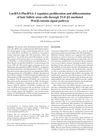 25 citations,
November 2017 in “Molecular Medicine Reports”
25 citations,
November 2017 in “Molecular Medicine Reports” PlncRNA-1 helps hair follicle stem cells grow and develop by controlling a specific cell signaling pathway.
December 2022 in “Biochemical and Biophysical Research Communications” HtrA2 activity is crucial for normal hair growth by regulating fat cell development.
Black sesame oil promotes hair growth and may prevent hair loss.
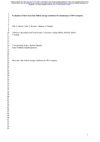 October 2023 in “bioRxiv (Cold Spring Harbor Laboratory)”
October 2023 in “bioRxiv (Cold Spring Harbor Laboratory)” Hair follicles can be kept in RNAlater® at cool or room temperature for a week without harming RNA quality.
 118 citations,
August 2010 in “Developmental Cell”
118 citations,
August 2010 in “Developmental Cell” MIM is crucial for hair follicle formation and regeneration by controlling cilia formation and hedgehog signaling through its interaction with Cortactin and Src.
78 citations,
November 2014 in “Functional Ecology” Heavily hunted wolves have higher stress and reproductive hormone levels.
 January 2022 in “Indian journal of dermatopathology and diagnostic dermatology”
January 2022 in “Indian journal of dermatopathology and diagnostic dermatology” Women with diffuse hair loss often have lower iron and vitamin D levels, but their thyroid function is typically normal.

Ovol2 is crucial for hair growth and skin healing by controlling cell movement and growth.
 January 2023 in “Health science reports”
January 2023 in “Health science reports” French maritime pine bark extract significantly increased hair density in menopausal women.
 February 1938 in “Journal of the American Medical Association”
February 1938 in “Journal of the American Medical Association” Washing can prevent cancer from lubricating oils, extreme body temperatures need more study, Sulfomid is not recognized, no reliable diphtheria carrier treatment except surgery, eyelid injuries should heal before repair, heterophile antibody test is specific for mononucleosis, chlorine inhalations for colds are outdated, and wheat germ is safe.
 4 citations,
March 2014 in “The FASEB Journal”
4 citations,
March 2014 in “The FASEB Journal” The HIF-2α/ARNT complex is important for hair follicle development by controlling cell growth.
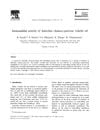 75 citations,
January 1997 in “Journal of ethnopharmacology”
75 citations,
January 1997 in “Journal of ethnopharmacology” Santolina chamaecyparissus oil effectively fights fungal infections.
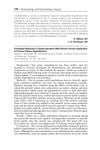 January 2012 in “Yearbook of Dermatology and Dermatologic Surgery”
January 2012 in “Yearbook of Dermatology and Dermatologic Surgery” Electric current quickly reduces hand sweating but the effect doesn't last long.
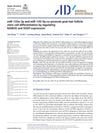 November 2023 in “Animal Bioscience”
November 2023 in “Animal Bioscience” miR-133a-3p and miR-145-5p help goat hair follicle stem cells differentiate by controlling NANOG and SOX9.
 17 citations,
August 2018 in “BMC Genomics”
17 citations,
August 2018 in “BMC Genomics” The HOXC13 gene affects different hair proteins in cashmere goats in varied ways and is controlled by a feedback loop and other factors.
 8 citations,
July 2022 in “Frontiers in plant science”
8 citations,
July 2022 in “Frontiers in plant science” pH changes are crucial for root hair growth because they affect enzymes and proteins that control the cell wall and growth.
 1 citations,
January 2024 in “Advanced science”
1 citations,
January 2024 in “Advanced science” Fibronectin-attached cell sheets improve wound healing and are safe and effective.
 7 citations,
August 2022 in “Journal of Nanobiotechnology”
7 citations,
August 2022 in “Journal of Nanobiotechnology” Advancements in nanoformulations for CRISPR-Cas9 genome editing can respond to specific triggers for controlled gene editing, showing promise in treating incurable diseases, but challenges like precision and system design complexity still need to be addressed.
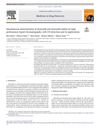 4 citations,
May 2020 in “Medicine in Drug Discovery”
4 citations,
May 2020 in “Medicine in Drug Discovery” The study developed a method to detect minoxidil and its sulfate form, found that minoxidil sulfate is temperature-sensitive, and identified a way to potentially increase its stability for hair loss treatment.
 7 citations,
May 2016 in “European Polymer Journal”
7 citations,
May 2016 in “European Polymer Journal” The new nanocarriers improve how well water-insoluble drugs dissolve and allow for controlled drug release.
 June 2010 in “Expert Review of Dermatology”
June 2010 in “Expert Review of Dermatology” Scientists found key proteins and genes that affect skin and hair health, and identified potential new treatments for hair loss, skin disorders, and wound healing.
 127 citations,
December 2005 in “Experimental Dermatology”
127 citations,
December 2005 in “Experimental Dermatology” Stress can stop hair growth in mice, and treatments can reverse this effect.
 2 citations,
March 2023 in “Biomedicine & pharmacotherapy”
2 citations,
March 2023 in “Biomedicine & pharmacotherapy” Platelet lysate effectively promotes hair growth and improves hair thickness in people with androgenetic alopecia.
 January 2020 in “Egyptian Journal of Dermatology and Venereology”
January 2020 in “Egyptian Journal of Dermatology and Venereology” People with alopecia have shorter hair follicles and more c-kit, a stem cell factor receptor, which could predict how the condition progresses.
 6 citations,
July 2023 in “Nature cell biology”
6 citations,
July 2023 in “Nature cell biology” SOX9 helps determine stem cell roles by interacting with DNA and proteins that control gene activity.
 July 1998 in “Chromatographia”
July 1998 in “Chromatographia” Women with effluvium have higher levels of certain urinary steroids, possibly due to stress and increased adrenal activity.
 February 2023 in “International Journal of Advanced Research in Science, Communication and Technology”
February 2023 in “International Journal of Advanced Research in Science, Communication and Technology” Herbal shampoos with Neem and Tulsi might be safer and more effective for controlling dandruff.


























